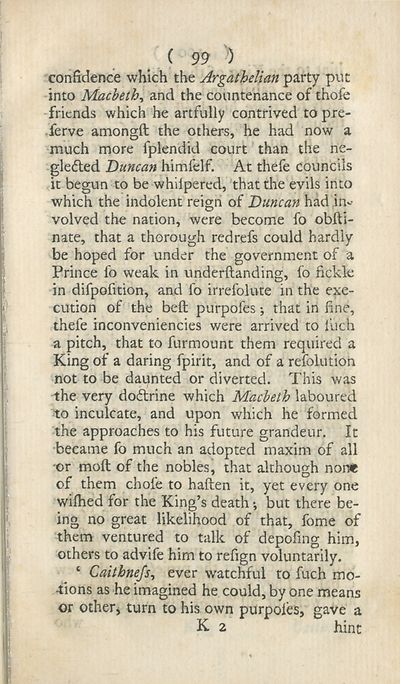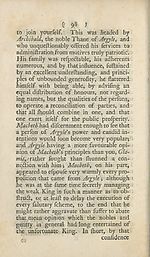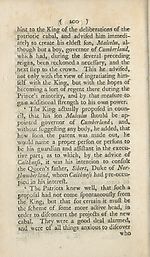Download files
Complete book:
Individual page:
Thumbnail gallery: Grid view | List view

( 99 )
confidence which the Argathelian party put
into Macbeth, and the countenance of thofe
friends which he artfully contrived to pre-
ferve amongft the others, he had now a
much more fplendid court than the ne¬
glected Duncan himfelf. At thefe councils
it begun to be whilpered, that the evils into
which the indolent reign of Duncan had in¬
volved the nation, were become fo obfti-
nate, that a thorough redrefs could hardly
be hoped for under the government of a
Prince fo weak in underftanding, fo fickle
in difpofition, and fo irrefolute in the exe¬
cution of the belt purpofes; that in fine,
thefe inconveniencies were arrived to 1’uch
a pitch, that to furmount them required a
King of a daring fpirit, and of a refolution
not to be daunted or diverted. This was
the very doftrine which Macbeth laboured
to inculcate, and upon which he formed
the approaches to his future grandeur. It
became fo much an adopted maxim of all
•or molt of the nobles, that although nor*
of them chofe to haften it, yet every one
wifhed for the King’s death •, but there be¬
ing no great likelihood of that, fome of
them ventured to talk of depofing him,
others to advife him to refign voluntarily.
‘ Caithnefs, ever watchful to fuch mo¬
tions as he imagined he could, by one means
or other* turn to his own purpoies, gave a
K 2 hint
confidence which the Argathelian party put
into Macbeth, and the countenance of thofe
friends which he artfully contrived to pre-
ferve amongft the others, he had now a
much more fplendid court than the ne¬
glected Duncan himfelf. At thefe councils
it begun to be whilpered, that the evils into
which the indolent reign of Duncan had in¬
volved the nation, were become fo obfti-
nate, that a thorough redrefs could hardly
be hoped for under the government of a
Prince fo weak in underftanding, fo fickle
in difpofition, and fo irrefolute in the exe¬
cution of the belt purpofes; that in fine,
thefe inconveniencies were arrived to 1’uch
a pitch, that to furmount them required a
King of a daring fpirit, and of a refolution
not to be daunted or diverted. This was
the very doftrine which Macbeth laboured
to inculcate, and upon which he formed
the approaches to his future grandeur. It
became fo much an adopted maxim of all
•or molt of the nobles, that although nor*
of them chofe to haften it, yet every one
wifhed for the King’s death •, but there be¬
ing no great likelihood of that, fome of
them ventured to talk of depofing him,
others to advife him to refign voluntarily.
‘ Caithnefs, ever watchful to fuch mo¬
tions as he imagined he could, by one means
or other* turn to his own purpoies, gave a
K 2 hint
Set display mode to:
![]() Universal Viewer |
Universal Viewer | ![]() Mirador |
Large image | Transcription
Mirador |
Large image | Transcription
| Antiquarian books of Scotland > Languages & literature > Key to the drama > (121) |
|---|
| Permanent URL | https://digital.nls.uk/122387168 |
|---|
| Description | Thousands of printed books from the Antiquarian Books of Scotland collection which dates from 1641 to the 1980s. The collection consists of 14,800 books which were published in Scotland or have a Scottish connection, e.g. through the author, printer or owner. Subjects covered include sport, education, diseases, adventure, occupations, Jacobites, politics and religion. Among the 29 languages represented are English, Gaelic, Italian, French, Russian and Swedish. |
|---|

